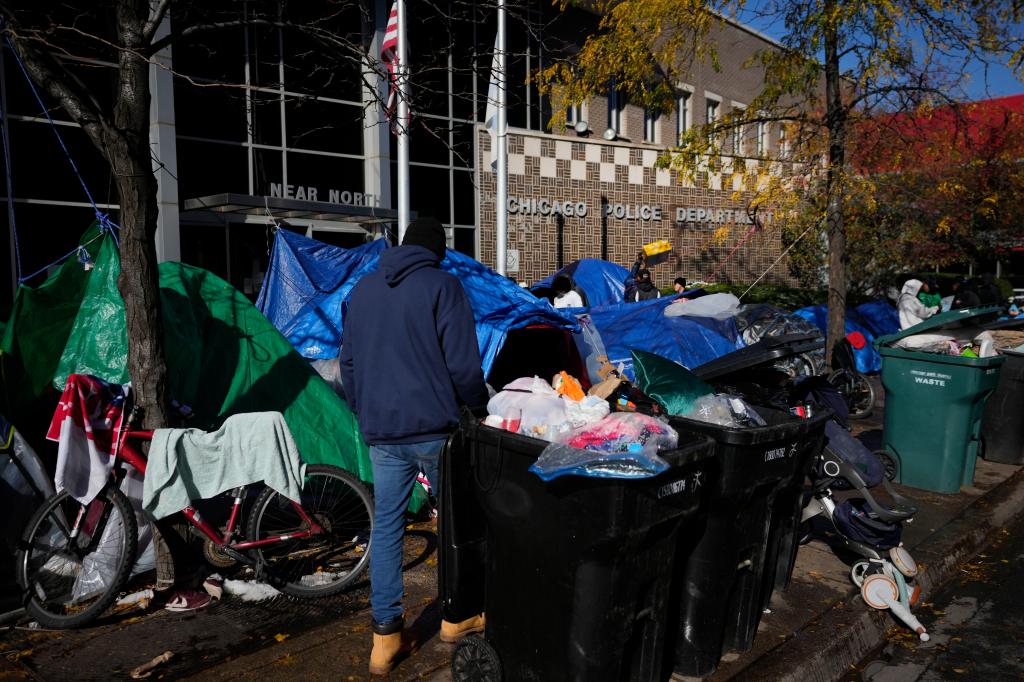Migrants scour trash for food as they live out of buses in Chicago
Hundreds of migrants in Chicago are living in buses — with some desperately digging through trash bins for food — as the Windy City’s shelter system groans under an onslaught of asylum seekers.
With an estimated 34,000 migrants arriving in Chicago in the past 16 months — and buses packed with fresh arrivals continuing to roll in on a regular basis — the city had initially turned to its police precincts to help house the throngs.
But Chicago officials put the kibosh on the stopgap measure in December, and with the city’s 27 designated shelter buildings still stretched to capacity, authorities have been forced to find other housing options while migrants scrounge for the bare necessities.
Eight so-called “warming buses” were added to its West Loop last month to try to ease some of the load, according to the Chicago Tribune.
Creature comforts have been in short supply in the cramped buses as the city struggles to provide even basic necessities such as food and on-site shower facilities. Most of the migrants, including families, have had to subsist on little more than packets of oatmeal and Nutri-Grain bars doled out by volunteers, the report said.
“If you’re not given food, you go to extreme measures,” Robinson Mendez, 30, of Venezuela told the outlet.
“You look for food in the trash.”
Mendez described a scene he recently witnessed where three boxes of sandwiches found in the trash set off a feeding frenzy among hungry migrants, who quickly shoveled the discarded food into their mouths.
Attempts to provide the Chicago asylum seekers with adequate shower facilities have also run into difficulties.
Local volunteer Annie Gomberg reached out to ShowerUp, a charity that provides mobile showers for homeless people living outside, but upon arriving at the West Loop landing zone, city officials told the organization that they lacked the necessary power and water hookups they’d need to set up.
Chicago’s Office of Emergency Management and Communications rep Mary May told the Tribune that her agency was unable to accommodate the volunteer groups’ request because they did not communicate their intentions to the city ahead of time.
“Personnel from Chicago’s Office of Emergency Management and Communications were unaware of this and without advance notice were not able to make the appropriate arrangements to accommodate them,” May said.
“This includes access to the water hookup for the mobile shower trailer that can only be turned on with advance notice. It’s not a simple procedure,” advocates said.
As a result, migrants on the buses have gone days without running water, the outlet said.
“Everybody here is kind of warehoused up,” Gomberg told the outlet. “They don’t know what’s happening and they don’t know what’s really going on. We’re going on a week of these folks not having access to hygiene.”
At a virtual meeting Dec. 27, Chicago Mayor Brandon Johnson joined New York City Mayor Eric Adams and Denver Mayor Mike Johnston in imploring the Biden administration to provide more federal resources to help their cities cope with their rising migrant populations.
New York City has been in crisis for months over the tens of thousands of migrants it has received since spring 2022, creating tent cities in parks and occasionally using public school gyms to help handle its flood — while cutting back on services because it has faced a budget gap of billions of dollars.
“All of our cities have reached a point where we are either close to capacity or nearly out of room,” Johnston said.
The situation has been similar at the state level as well.
Last week, Illinois announced plans to establish an intake center for new arrivals at the bus landing zone in Chicago, which the state says will include a half-dozen heated tents, but offered no specific timeline beyond “in the coming weeks.”
A press release issued by the state Wednesday said the intake center “is not intended to provide shelter” for migrants but rather as a temporary way-stop on their journey to accommodations elsewhere.
“It is designed to help individuals upon their arrival at the landing zone to receive expanded services and support in a more streamlined process and to unite them with their friends and family and/or help them advance to other destinations to avoid unnecessary admission into shelters,” the statement said.
Chicago officials have faced increasing pressure to provide healthier and cleaner accommodations for the newly arriving asylum seekers after the death of Jean Carlos Martinez Rivero, 5, who became ill while sheltering in a Lower West Side warehouse with thousands of other migrants, the Tribune writes.
Some migrants have found everyday Chicagoans being more sympathetic to their plight than the city itself.
“The people on the street help us more than the city. They give us clothes, jackets,” 23-year-old Angelo Traviezo told the outlet, expressing surprise that he’s had to look for food in trash bins since arriving in Chicago.













